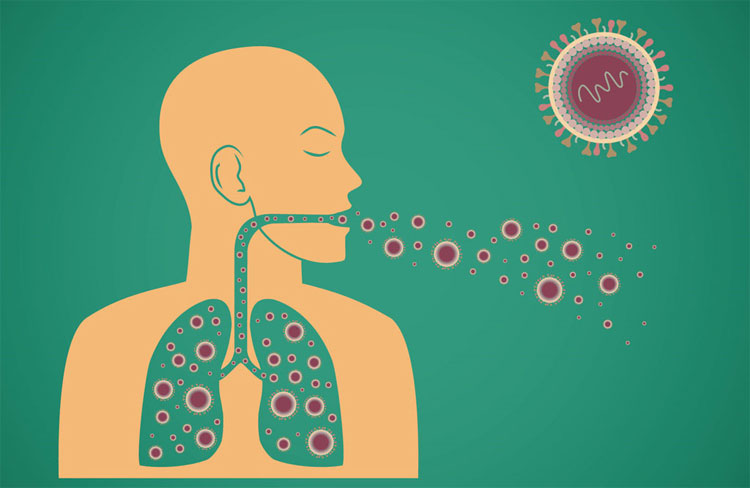The reason for infectious diseases is increasing
Over the past few decades, the world has witnessed a sudden increase in alarming levels of new infectious diseases. What is the reason why infectious diseases are increasing?
Zika, Ebola Virus, Middle East Respiratory Syndrome (MERS), Severe Acute Respiratory Syndrome (SARS), Nipah virus, Hendra virus, bird flu, swine flu are diseases that have attracted national attention. in recent years. Since 1980, on average every three years people face new pathogens.
One could argue that these epidemics are actually not new, they have existed in human society for centuries but have only recently been known for scientific progress. This is only true in some cases. In other words, new pathogens are actually increasing.

Since 1980, on average every three years people face new pathogens.
Explaining this phenomenon, The Huffinton Post offers the following reasons.
The phrase 'born like a rabbit' should probably be changed to 'giving birth like a human being' because no animal in the world can match humans in terms of reproductive speed. The more population grows, the less available land is and the more people have to live in crowded urban environments, the ideal conditions for disease agents to appear and spread.
Tourism development
Long trips increase the risk of infection and transport pathogens from one place to another.
Numerous diseases are transmitted through insects including mosquitoes, mites and spiders. The life cycle of a pathogenic vector depends on climate factors and climate change that helps some species such as mosquitoes thrive. Warm temperatures shorten the viral incubation period, promote the maturation of mosquito larvae as well as increase the frequency of feeding of adult mosquitoes. Since then, humanity is prone to diseases that are typical of Zika.
Cutting down trees causes soil to store rainwater, creating a favorable environment for mosquitoes. Lyme disease is tending to increase by people who encroach on forests. Nipah virus is a newly discovered pathogen, causing health concerns because it can be quickly transmitted from animals (such as pigs) to humans and leads to death.
Trade and produce animal food
2/3 of new diseases come from animals. As the demand for meat, skin and other animal-related pleasures increases, our risk of infection also increases.
The more we go into the deep forest to catch animals, the more likely we are to face individuals with new viruses. Although it is unclear exactly how humans have been exposed to Zika, the scientific community confirmed that the virus was first discovered in brown monkeys.
Worse, wild animals are transferred from one place to another or are brutally killed, enabling pathogens to grow and attack humans. This is the reason why SARS outbreaks. Scientists believe that the SARS virus is inherent in fruit bats. Due to the trafficking process, bats come into contact with cats in Guangdong (China), SARS from bats is transferred to cats and transmitted to humans.
By creating sick animals, we put ourselves in danger. Besides, animal breeding is the ideal environment for viruses, bacteria and parasites.
Every time a new infectious disease breaks out, we follow the familiar pattern: panic, wonder why this happens, race to create new drugs, breathe a sigh of relief when the translation is over. continue acts that contribute to disease. Don't forget that drugs and vaccines are just a temporary measure. In particular, the vaccine may promote the evolution of the virus leading to drug-resistant strains.
- Infectious diseases and unexpected effects
- 70% of emerging infectious diseases are caused by animal transmission
- Special test system for diagnosing infectious diseases
- Vitamins and infectious diseases
- Prevent pets from spreading infectious diseases to their owners
- Artificial light is easy to cause infectious disease
- ADB helps Vietnam control infectious diseases
- Self-detectable infectious disease kits will save millions of lives
- Science proves the reason for people to marry
- Alzheimer's disease and Parkinson's are not contagious
- Does genetic disease affect IQ?
- You may be suffering from up to 5 infectious diseases every day
 Green tea cleans teeth better than mouthwash?
Green tea cleans teeth better than mouthwash? Death kiss: This is why you should not let anyone kiss your baby's lips
Death kiss: This is why you should not let anyone kiss your baby's lips What is salmonellosis?
What is salmonellosis? Caution should be exercised when using aloe vera through eating and drinking
Caution should be exercised when using aloe vera through eating and drinking British Doctor Reveals How to Make Your Brain '30-50 Years Younger', So Simple Anyone Can Do It
British Doctor Reveals How to Make Your Brain '30-50 Years Younger', So Simple Anyone Can Do It  Discovering more than 2 million new crystal structures, Google's AI shortens 800 years of research for humanity
Discovering more than 2 million new crystal structures, Google's AI shortens 800 years of research for humanity  World's rarest whale carcass washes ashore in New Zealand
World's rarest whale carcass washes ashore in New Zealand  Japan develops breakthrough medicine from... volcano crater
Japan develops breakthrough medicine from... volcano crater  Based on new theory, physics 'captures' a photon for the first time
Based on new theory, physics 'captures' a photon for the first time  Is death the end?
Is death the end? 